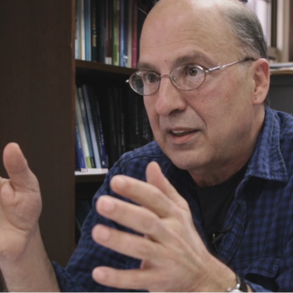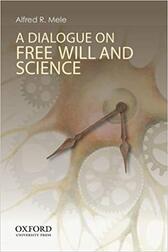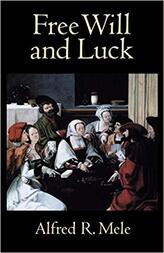Psi
Menu
III - THE INTERVIEWS
Chapter 15
Alfred Mele: The Agnostic (Jan 2015)
Alfred Mele: The Agnostic (Jan 2015)
|
Following my interview with Kane, I flew to Tallahassee to meet with Alfred Mele, professor of philosophy at Florida State University and director from 2010 to 2013 of the multi-million dollar “Big Questions in Free Will” project.
Mele has developed both compatibilist and libertarian views, officially agnostic about which kind of free will should be argued for. However, he has been fairly vocal about rejecting most of the neuroscience purportedly claiming that we have no free will (in the libertarian sense). In particular, he has spent a great deal of effort trying to downplay the conclusions drawn from the famous “Libet experiments,” which kicked-off the contemporary resurgence in interest in the “free will vs determinism” debate and caught the attention of the media and public at large. In 1983, neuroscientist Benjamin Libet conducted a study to measure the moment in the process leading up to an act when a subject becomes consciously aware of the decision to act (here, to move a finger). Earlier studies had already shown a peak in brain activity before the decision to flex a muscle and had called it a readiness potential. Libet’s goal was to see when the conscious awareness of the intent appeared in relation to this readiness potential, with famous neurobiologist John Eccles postulating that it had to come before.
In the experiment, Libet asked people to watch a small clock-like device with a dot moving around the frame and to remember where the dot was when they first became aware of their decision to move their finger, with an electroencephalogram monitoring their brain activity throughout. The observations were rather surprising: while the device picked up the readiness potential in the brain about 550 milliseconds before the motion, the subjects reported an awareness of the intent to move only around 200 milliseconds before the muscle moved. In other words, the subjects were consciously aware of the decision to flex about 350 milliseconds after the unconscious activity of the brain.
This led to a flurry of interpretations that the brain is “making decisions” automatically before our awareness kicks-in after the fact. This inspired many magazine covers touting that scientists had disproved free will - despite Libet’s own opinion, which was that the subject still had the ability to interrupt a readiness potential and essentially veto an act before doing it (what some called free won’t). Yet, the damage was done in popular science and Libet had supposedly paved the way to proving that free will is an illusion.
Mele has done a great deal to critically examine Libet’s experiments and seriously challenge it on all fronts: its experimental methodology (such as not recording brain activity long before the readiness potential to see if it's an isolated burst or not), the results they yielded (there are issues with the reliability of subjects self-reporting a time on a clock), the interpretation of the results (the early spike in activity may not necessarily correspond to anything causally linked with the motion) and the conclusions that were drawn from the results (which don’t necessarily disprove free will, given that moving a finger doesn’t involve much if any conscious reasoning and therefore is probably not the best test for a free-willed decision). Listening to him essentially “debunk” the Libet experiment was terrifically refreshing, and showed me how even well established and cited studies/experiments can be grossly overblown in popular conversation.
|
[email protected]
© COPYRIGHT 2022. ALL RIGHTS RESERVED.
© COPYRIGHT 2022. ALL RIGHTS RESERVED.



